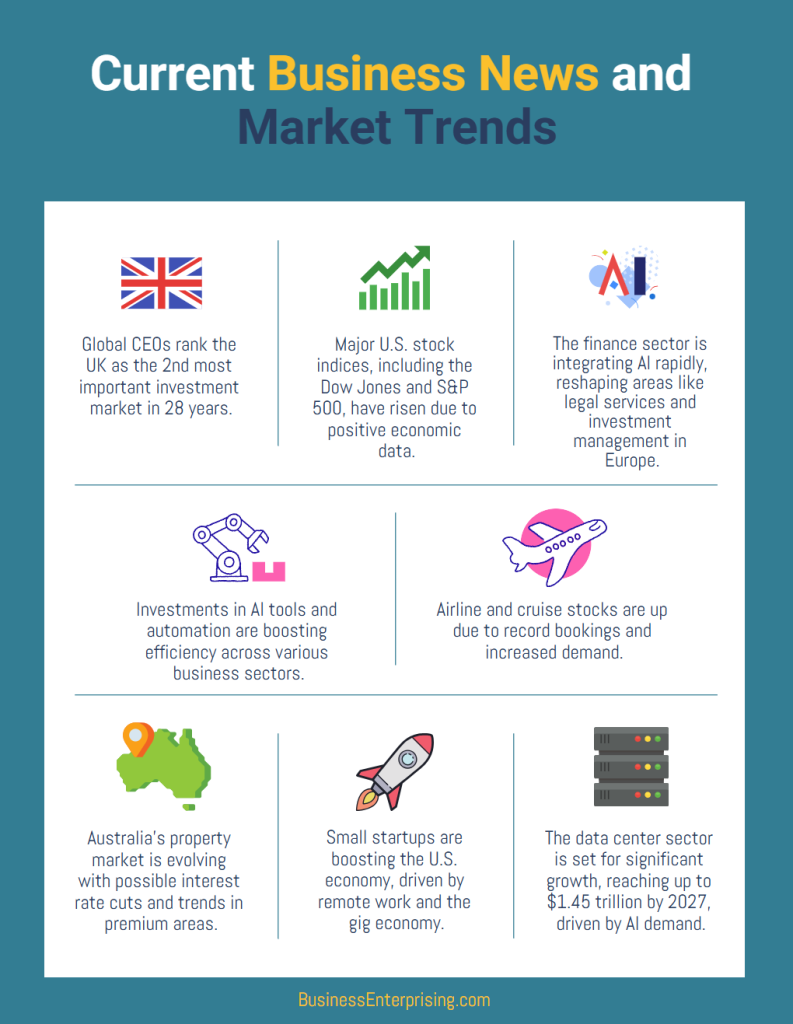 Understanding business news and market trends is essential for navigating today’s competitive economy. Markets shift quickly, driven by emerging technologies, evolving consumer preferences, and global events. These changes create both opportunities and challenges for businesses.
Understanding business news and market trends is essential for navigating today’s competitive economy. Markets shift quickly, driven by emerging technologies, evolving consumer preferences, and global events. These changes create both opportunities and challenges for businesses.
Additionally, staying updated on trends allows you to identify growth areas and adapt your strategies effectively. However, this requires consistent monitoring of economic indicators, industry developments, and regulatory updates. Keeping a close eye on these factors helps you make informed decisions.
In this discussion, you will explore key aspects of business news and market trends. This insight will help you respond to changes and position your business for long-term success.
Current Economic Overview
The U.S. economy is currently experiencing a period of steady growth, with real gross domestic product (GDP) increasing at an annual rate of 3.1% in the third quarter of 2024. This growth is primarily driven by consumer spending, exports, business investment, and federal government expenditure. Such economic expansion fosters a favorable environment for businesses, encouraging investment and operational scaling.
Despite this positive trajectory, inflation remains a pertinent concern. As of December 2024, the inflation rate stood at 2.9% year-over-year, indicating a gradual decline yet still above the Federal Reserve’s 2% target. Elevated inflation can erode purchasing power and increase operational costs for businesses, necessitating strategic planning to mitigate these effects.
The labor market continues to demonstrate resilience, with the unemployment rate decreasing to 4.1% in December 2024. This low unemployment rate suggests a competitive job market, which may lead to wage growth as businesses strive to attract and retain talent. While beneficial for employees, rising wages could contribute to inflationary pressures, presenting a complex scenario for business planning.
In summary, the current economic indicators reflect a robust U.S. economy with sustained GDP growth and a strong labor market. However, persistent inflation requires vigilant monitoring. Staying informed about these developments is essential for navigating the evolving landscape of business news and market trends.
Emerging Industry Trends
As we progress through 2025, several industries are experiencing notable growth and transformation. Artificial intelligence (AI) continues to advance, with AI agents evolving from basic chatbots to autonomous systems capable of managing complex tasks like scheduling and software development. This evolution is expected to significantly impact various sectors, enhancing efficiency and productivity.
The renewable energy sector is also undergoing significant developments. The International Energy Agency (IEA) highlights a new era for nuclear energy, driven by efforts to reduce emissions. However, challenges such as cost overruns and delays pose risks to this growth. Additionally, investments in offshore wind farms are increasing, with companies like Mingyang Smart Energy planning to establish manufacturing facilities abroad, indicating a global expansion in green energy initiatives.
E-commerce continues to thrive, with live social media shopping emerging as a significant trend. Platforms like TikTok and Instagram are transforming the retail experience, allowing consumers to make instant purchases without leaving the app. This shift is reshaping consumer behavior and presenting new opportunities for businesses to engage with their audience.
Staying informed about these developments is essential for navigating the evolving landscape of business news and market trends. By understanding and adapting to these emerging industry trends, you can position your business to capitalize on new opportunities and mitigate potential challenges.
Technological Advancements Shaping Business
Technological advancements are significantly influencing business operations and strategies. Blockchain technology, for instance, is transforming various industries by providing secure, transparent, and decentralized methods for record-keeping and information sharing. In the insurance sector, blockchain enables the use of smart contracts, which execute automatically when predefined conditions are met, thereby enhancing efficiency and reducing operational costs.
Moreover, the integration of blockchain with 5G networks is paving the way for innovative applications in industrial automation. This combination facilitates secure and efficient communication among Internet of Things (IoT) devices, leading to the development of smart cities, healthcare systems, and supply chain management solutions.
Automation, powered by advancements in artificial intelligence (AI) and machine learning, is also reshaping business processes. Companies are adopting AI-driven automation to streamline operations, improve decision-making, and reduce costs. For example, AI can analyze large datasets to identify patterns and insights, enabling businesses to respond swiftly to market changes.
Additionally, the deployment of 5G technology is revolutionizing communication networks. With its high-speed connectivity and low latency, 5G supports the proliferation of IoT devices and real-time data processing. This advancement allows businesses to implement intelligent automation systems, enhancing productivity and operational efficiency.
Staying informed about these technological advancements is essential for navigating the evolving landscape of business news and market trends. By understanding and leveraging innovations like blockchain, automation, and 5G, you can position your business to capitalize on new opportunities and maintain a competitive edge.
Shifts in Consumer Behavior
Consumer behavior is undergoing significant transformations, with preferences shifting towards sustainability, personalization, and digital-first approaches. These changes are influencing how businesses operate and strategize. Understanding these shifts is essential for staying competitive in the current market.
Sustainability has become a priority for many consumers. People are increasingly aware of their environmental and social impact, leading to a demand for eco-friendly products and ethical business practices. Companies are responding by adopting sustainable practices and offering products that align with these values. This trend is not just a niche preference but a mainstream expectation.
Personalization is another key trend shaping consumer behavior. Advancements in technology allow businesses to offer tailored experiences, making consumers feel valued and understood. Retailers are leveraging data to provide customized services, enhancing customer satisfaction and loyalty. This approach is becoming a standard in the industry.
The shift towards digital-first approaches is also notable. Consumers expect seamless online experiences, from browsing to purchasing. Social commerce, where shopping integrates with social media platforms, is gaining traction. Businesses are adapting by enhancing their online presence and utilizing digital tools to engage customers effectively. This evolution reflects the growing importance of digital channels in consumer decision-making.
Staying informed about these developments is crucial for navigating the evolving landscape of business news and market trends. By aligning with these consumer preferences, businesses can position themselves for success in a dynamic market environment.
Global Market Developments
Global market developments in 2025 are influenced by various international market trends, trade relations, and geopolitical factors. The International Monetary Fund (IMF) projects global economic growth at 3.3% for 2025, driven by stronger-than-expected U.S. performance. However, this optimism is tempered by concerns over potential protectionist policies, such as tariffs and subsidies, which could disrupt global trade dynamics.
The re-election of President Donald Trump introduces uncertainties in global trade relations. His administration’s stance on imposing tariffs, particularly targeting the European Union, poses challenges for economies like Ireland, which rely heavily on U.S. multinationals. Such measures could prompt companies to reconsider their operational bases, affecting international investment flows.
Despite these challenges, there is a notable shift in investment preferences. A survey by PwC reveals that global CEOs now rank the United Kingdom as the second most important market for investment, following the United States. This marks the UK’s highest position in the survey’s 28-year history, indicating a renewed confidence in its economic prospects.
Geopolitical tensions continue to shape the global business environment. The World Economic Forum’s Global Risks Report 2025 highlights concerns over state-based armed conflicts and geoeconomic confrontations. These issues underscore the importance of strategic planning for businesses operating across borders.
Staying informed about these developments is essential for navigating the evolving landscape of business news and market trends. By understanding the interplay of economic indicators and geopolitical factors, you can better position your business to adapt to the changing global market.
Regulatory Changes and Policy Updates
In 2025, several regulatory changes and policy updates are impacting various industries and markets. Notably, the Internal Revenue Service (IRS) has adjusted tax brackets and standard deductions for inflation. For instance, the standard deduction for married couples filing jointly has increased to $30,000, up from $29,200 in 2024. These adjustments aim to account for inflation and affect taxpayers’ liabilities.
Additionally, the IRS has raised the foreign-earned income exclusion to $130,000 for 2025, up from $126,500. This change benefits U.S. citizens working abroad by reducing their taxable income.
In the corporate sector, the Tax Relief for American Families and Workers Act has reinstated certain business tax breaks. These include immediate deductions for domestic research costs and full expensing for capital expenditures. Such provisions aim to stimulate investment and innovation within the U.S. economy.
Moreover, the Bank of England is proposing a ‘concierge’ service to assist foreign firms in establishing operations in the UK. This initiative is part of broader efforts to attract international businesses and foster economic growth.
Staying informed about these developments is essential for navigating the evolving landscape of business news and market trends. Understanding these regulatory changes enables you to adapt your strategies and maintain compliance in a dynamic environment.
Conclusion
Staying informed about business news and market trends is key to making smart decisions in a constantly shifting environment. As industries evolve and new challenges arise, businesses must adapt to remain competitive. By tracking emerging technologies, consumer preferences, and global developments, you can identify opportunities and anticipate risks.
Additionally, understanding regulatory updates and market dynamics will help you refine your strategies. These insights provide a foundation for building resilience and fostering growth. However, adapting to changes requires a proactive approach and a commitment to staying informed.
In conclusion, staying engaged with current business news and market trends allows you to align your decisions with the ever-changing market demands. By doing so, you position yourself for success and maintain a competitive edge in a dynamic global economy.



